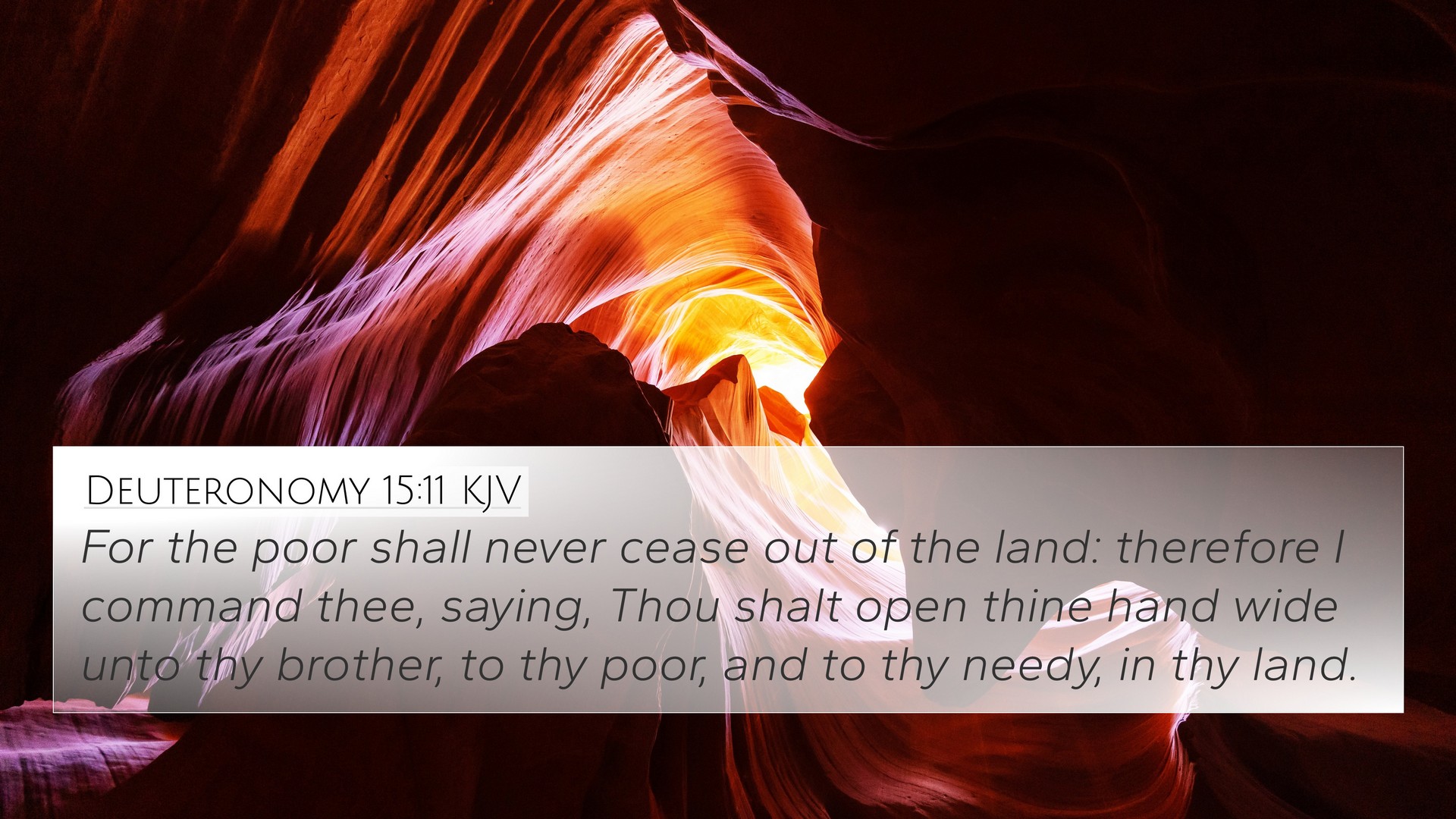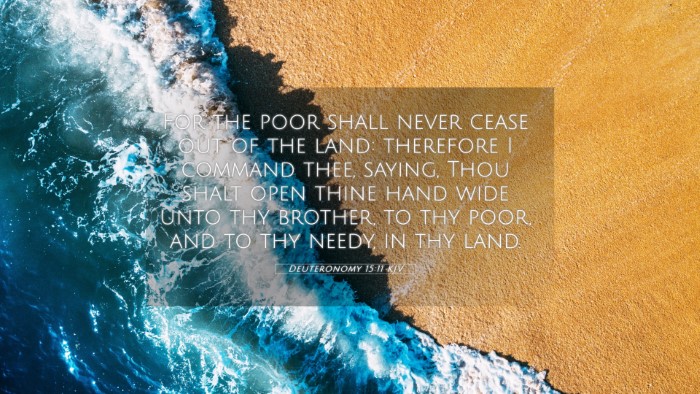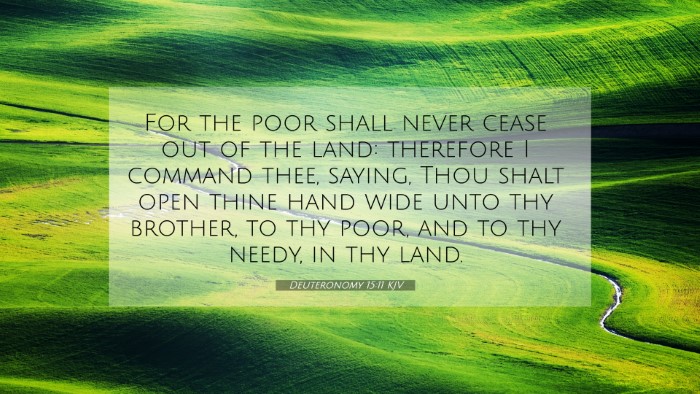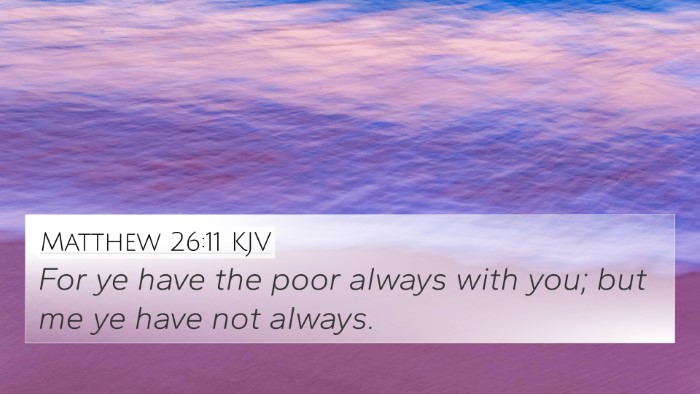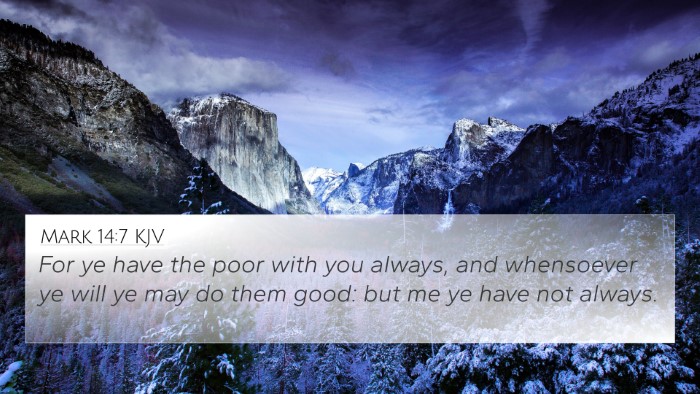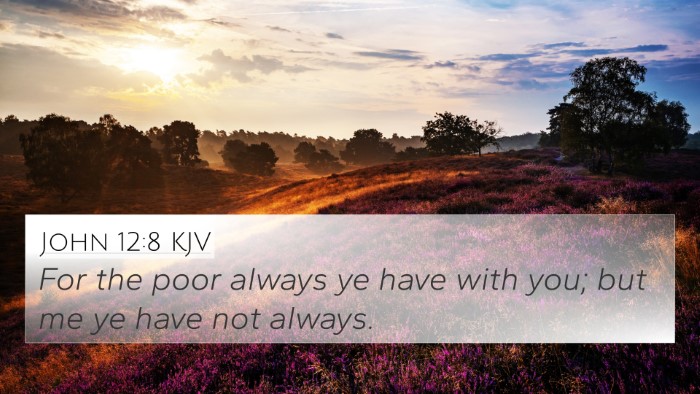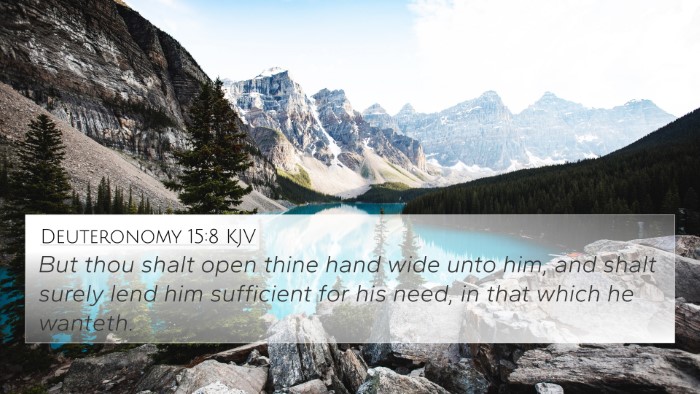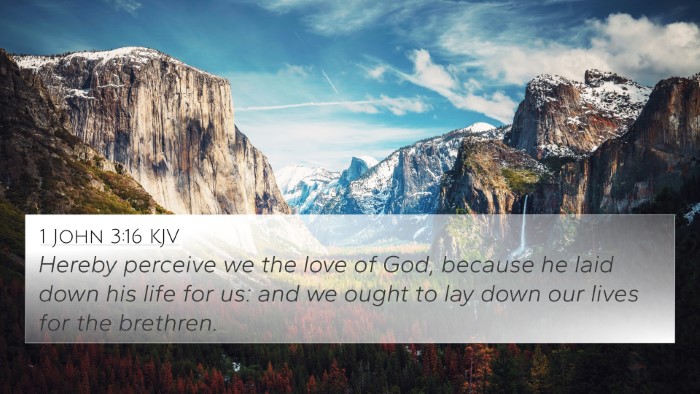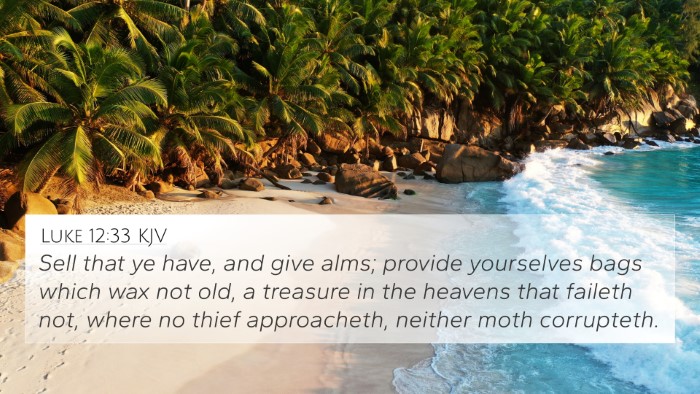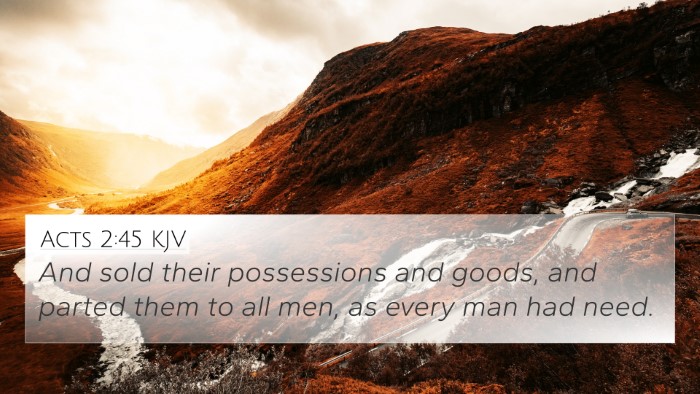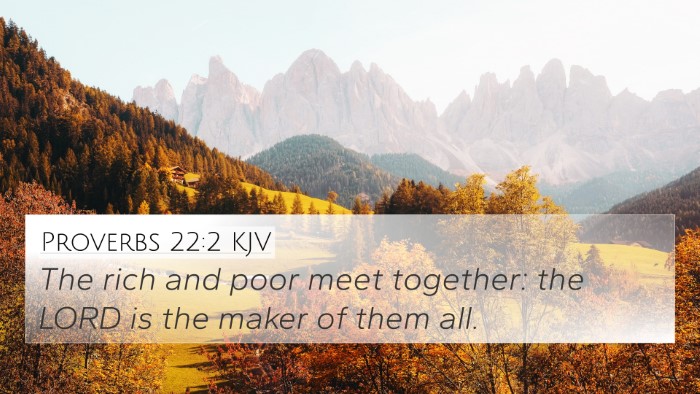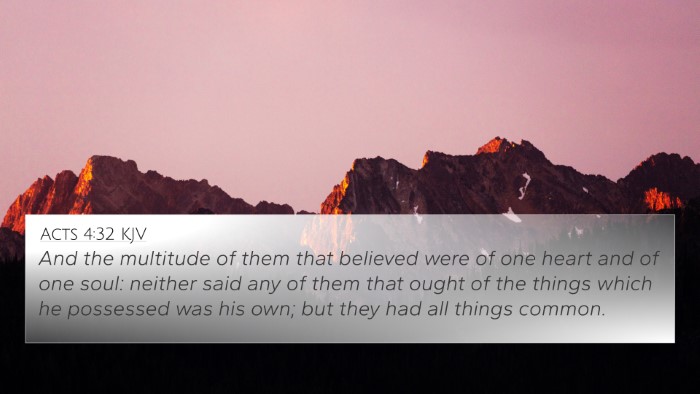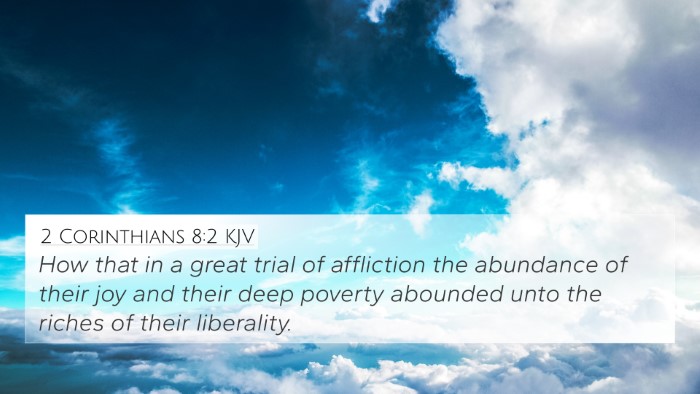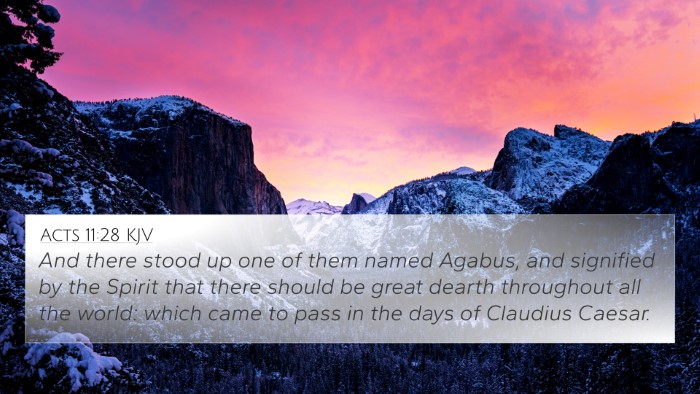Understanding Deuteronomy 15:11
Deuteronomy 15:11 states, "For there will never cease to be poor in the land. Therefore I command you, 'You shall open wide your hand to your brother, to the needy and to the poor, in your land.' This verse sheds light on God's command to care for the less fortunate and emphasizes a principle of generosity and compassion.
Verse Analysis
This verse reflects a broader biblical theme of mercy and social justice. Various public domain commentaries provide insightful interpretations of this verse.
Matthew Henry Commentary
Matthew Henry notes that this directive is not merely a suggestion, but a command from God to His people. He highlights that the perpetual presence of the poor in society is a reality that cannot be ignored. He encourages believers to fulfil this command with a generous spirit, seeing the act of giving not just as an obligation, but as a means of demonstrating God's love and compassion through our actions.
Albert Barnes Commentary
Albert Barnes emphasizes the social responsibility that the Israelites had towards one another, stating that caring for the poor is essential in fostering a just society. He cites that the wealth of those with means is intended to assist those who are disadvantaged. This perspective is consistent with the New Testament teachings that also advocate for generosity towards the poor.
Adam Clarke Commentary
Adam Clarke provides a thoughtful reflection on the nature of poverty and the necessity for help. He indicates that while poverty is a persistent issue, it should result in the faithful being more inclined to offer assistance. Clarke also speaks to the spiritual implications of this verse, suggesting that acts of kindness towards the poor are reflections of one's relationship with God.
Thematic Connections
Deuteronomy 15:11 is connected to various other Bible verses and themes that emphasize God's concern for the poor and the importance of generosity. Below are key cross-references that deepen the understanding of this passage:
- Leviticus 19:10: "And you shall not strip your vineyard bare, neither shall you gather the fallen grapes of your vineyard; you shall leave them for the poor and for the sojourner: I am the Lord your God."
- Proverbs 19:17: "Whoever is generous to the poor lends to the Lord, and he will repay him for his deed."
- Matthew 5:42: "Give to the one who begs from you, and do not refuse the one who would borrow from you."
- Luke 6:38: "Give, and it will be given to you. Good measure, pressed down, shaken together, running over, will be put into your lap. For with the measure you use it will be measured back to you."
- James 1:27: "Religion that is pure and undefiled before God, the Father, is this: to visit orphans and widows in their affliction, and to keep oneself unstained from the world."
- Proverbs 14:31: "Whoever oppresses a poor man insults his Maker, but he who is generous to the needy honors him."
- 1 John 3:17: "But if anyone has the world's goods and sees his brother in need, yet closes his heart against him, how does God's love abide in him?"
- Isaiah 58:10: "If you pour yourself out for the hungry and satisfy the desire of the afflicted, then shall your light rise in the darkness, and your gloom be as the noonday."
- 2 Corinthians 9:7: "Each one must give as he has decided in his heart, not reluctantly or under compulsion, for God loves a cheerful giver."
- Acts 20:35: "In all things I have shown you that by working hard in this way we must help the weak and remember the words of the Lord Jesus, how he himself said, 'It is more blessed to give than to receive.'
Inter-Biblical Dialogue
The command to care for the poor and needy in Deuteronomy echoes throughout the entirety of scripture, creating an ongoing inter-biblical dialogue regarding social justice and charity. The interconnectedness of these themes facilitates a richer understanding of our responsibility towards others, both within the community of faith and in broader society.
Practical Application
As believers engage with Deuteronomy 15:11 and its related scriptures, they are encouraged to actively seek ways to assist those in need. This could involve financial support, volunteering time and resources, or advocating for social justice. The call to generosity is not only for the benefit of those in need but also enriches the giver spiritually as it aligns them with God's heart for humanity.
Conclusion
In summary, Deuteronomy 15:11 serves as a powerful reminder of God’s commands regarding the poor, urging believers to embody generosity as a reflection of their faith. Through examining this verse and its connections to other scriptures, individuals can cultivate a deeper understanding of what it means to live a life devoted to serving others.
Further Study
For those looking for in-depth study, various tools for Bible cross-referencing can assist in identifying connections and thematic analysis across the texts. Utilizing a Bible concordance or cross-reference Bible study guide can be incredibly beneficial in exploring these rich connections.
Whether you're a pastor preparing a sermon or an individual aiming for personal growth, understanding Deuteronomy 15:11 through these lenses equips you to live out the gospel's call to serve and uplift those in need.
